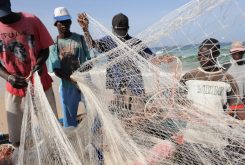The fate of the Greater Sunrise gas project in Timor-Leste hangs in the balance after two of the main investors pulled out, selling their equity shares to the government of Timor-Leste. This gives Dili much greater control of the scheme, allowing it to demand that the planned liquefied natural gas (LNG) plant is built on its territory rather than in Australia. Yet it also makes the process of securing the required investment more difficult, casting the entire venture in doubt.
ConocoPhillips agreed to sell its 30% stake in the project and equity in the associated offshore upstream Timorese and Australian blocks to the government of Timor-Leste for $350 million in October. Just one month later, Shell announced that it would sell its 26.56% share for $300 million. About 20% of the field’s reserves lie within the Joint Petroleum Development Area (JPDA) with Australia.
The Sunrise and Troubadour gas and condensate fields, which comprise Greater Sunrise, are located roughly 150 km southeast of Timor-Leste. They hold an estimated 5.13 trillion cubic feet of natural gas and 225.9 million barrels of condensate. A consortium of Woodside Petroleum, Shell, ConocoPhillips and Osaka Gas decided to develop a LNG project using the reserves but no progress was made for many years because of a maritime territorial dispute between Dili and Canberra.
In March, the two governments signed a maritime boundary delimitation treaty, appearing to break the impasse. However, the thorny question of whether to process the gas at an existing LNG plant at Darwin in Australia’s Northern Territory, or at a proposed plant in Timor-Leste continued to dog the scheme. A third option also emerged in the form of a floating LNG (FLNG) vessel that would obviate the need for any transmission pipeline. FLNGs, which are ships with LNG liquefaction, storage and offloading capacity, have only been developed in the past couple of years and are still very rare.
The project consortium was keen to utilise the existing gas pipeline that runs from Timor-Leste’s Bayu Undan field, which lies at the opposite corner of the JPDA to Greater Sunrise, to the Darwin LNG plant. Bayu Undan’s gas reserves are currently Timor-Leste’s main source of income but are expected to become exhausted soon after 2022, which would allow gas from Greater Sunrise to be transported via the line if it were extended across the JPDA. This extension would be shorter and so cheaper than a pipeline from Greater Sunrise to Timor-Leste. In the same way, using the Darwin LNG plant would be far cheaper than building a new liquefaction facility onshore Timor-Leste.
The withdrawal
When the delimitation treaty was concluded in March, the odds seemed slightly in favour of the gas being piped to Darwin rather than Timor-Leste, partly because the former would increase Dili’s share of the revenues from 70% to 80% to compensate for the loss of industrial development and job creation via the LNG plant. However, over the course of 2018 it became clear that Timor-Leste was not going to back down over its insistence that it should host the LNG facility. Dili’s insistence that the gas be liquefied at a proposed plant at Beaço on the south coast appears to have prompted Shell and ConocoPhillips to pull out of the scheme.
Explaining her company’s withdrawal, the chairperson of Shell Australia, Zoe Yujnovich, said: “We respect the Timor-Leste government’s determination to develop the Sunrise fields through an onshore LNG facility on its south coast. Although we formed different views about the optimal development scenario, we understand the priorities of the Timor-Leste government and wish it well in pursuing its aspirations to develop this important resource for the nation.”
ConocoPhillips also cited differences with the government over the development plan for its decision to divest its stake. The US firm continues to operate the Bayu Undan project and will now focus on identifying alternative sources of supply for its Darwin LNG facility. Xanana Gusmão, Timor-Leste’s special representative in the talks and also a former prime minister, commented: “Timor-Leste appreciates Shell’s willingness to sell its interests in the Greater Sunrise project…Shell’s attitude throughout the negotiations shows that it is ready to consider not only its commercial interests but also the interests of small nations.”
What happens now?
If completed as expected, the purchases would give the government a 56.6% stake in the venture, with Australian firm Woodside continuing to operate it with a 33.4% share and Osaka Gas retaining its 10% interest. ConocoPhillips expects its sale to be completed in the first quarter of 2019. Shell has not commented on the timetable for its deal but it is likely to be sometime in the first half of 2019.
The deal must be rubber stamped by the Timorese parliament and the remaining members of the project consortium but there are not expected to be any objections. However, Dili’s financial position is incredibly fragile and it has not yet revealed how it will fund its equity acquisitions. With the Bayu Undan reserves set to run out, the pressure on Dili to develop Greater Sunrise to replace them is enormous. Yet it must do so at a time of profound political instability (https://clbrief.com/a-defining-moment-for-timor-leste/)
The big question is whether Shell and Conoco-Phillips’ withdrawal will weaken the resolve of Osaka Gas and particularly Woodside to commit themselves to Greater Sunrise. If Woodside pulls out then the project is likely to collapse but if it remains then Dili will still have to persuade the Australian company of its plans. If a development plan is agreed, then the Timorese government must still raise its share of the plant’s construction costs. A single LNG production unit, known in the industry as a train, would cost upwards of $5 billion for production capacity of 5 million tonnes a year, while up to four trains have previously been considered.
Dili could effectively mortgage its future LNG revenues by repaying loans taken on to finance construction with LNG revenues, with Beijing the most likely source of finance. Even a concessional loan would be a huge financial gamble, despite the fact that the hydrocarbon reserves on the Greater Sunrise fields are currently valued at up to $65 billion. Dili has also suggested that it could set aside $5 billion from its Petroleum Wealth Fund to finance its share of the project’s capital costs, but it will be heavily reliant on the Fund to sustain government spending when the Bayu Undan revenues dry up. In its latest update, the government stated that it had $17.1 billion in its Petroleum Wealth Fund.
The Timorese parliament approved funding of $100 million to finance a feasibility study into the Beaço plant in September, while a floating, production, storage and offloading (FPSO) vessel will be required on the Greater Sunrise fields. The FPSO will separate condensate and natural gas production and then transfer the condensate to waiting vessels. Condensate is a very light form of crude oil that is used to make fuel. Dili has asked Australian businessman James Rhee to act as a consultant on the project: acting as mediator in negotiations with Woodside and identifying possible sources of funding.
Dili is convinced that the economic benefits of hosting an LNG plant will outweigh a reduced share of revenue. LNG schemes do generate employment but few Timorese currently have the skills and experience needed to take up highly skilled and better paid jobs on the scheme. The Timorese government also wants to build a refinery at the same site.
Outlook
Australian media have quoted unnamed Australian officials as saying that the project is now doomed, although publically Canberra is supportive. The Beaço pipeline will have to cross the Timor Trough, a 3.5km valley in the seabed, posing significant engineering challenges. Moreover, LNG plants are rarely developed in countries with little or no track record of developing similarly huge projects. This makes the venture more risky for investors. However, an even bigger LNG facility is planned in the far north of Mozambique (clbrief.com/liquefied-success-for-maputo/), which also lacks a track record in project development.
In December, Woodside’s chief executive, Peter Coleman, said that his company had not been in talks with Dili over selling its stake and remained committed to the project. However, some press reports in Australia have suggested that he is prepared to only invest in the upstream part of the venture, leaving the government to develop the LNG plant itself. The Australian Financial Review quotes him as saying: “If you disaggregate the project – meaning that the ownership of the onshore plant and the pipeline is different from the upstream – then we can see a pathway to investing in the upstream and that’s a model we see in Indonesia and Malaysia that works quite effectively.”
The price tags attached to the stakes are huge for Dili but seem low by international standards given the value of the gas reserves. ConocoPhillips’ Australia-West president, Chris Wilson, said that the sale price only covers the costs incurred by ConocoPhillips on the project to date. This may be because the possibility of the project never being developed has increased with Dili’s insistence on building the LNG plant at Beaço and so this eventuality may have been priced into the value of the stakes. Ignoring this possibility would be a gamble for giant oil companies but this is a gamble that the Timorese government can ill afford.



